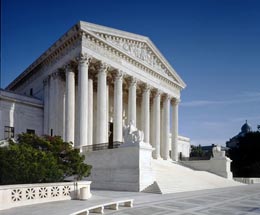On June 30, 1982, the U.S. Supreme Court rules that Initiative 350, a 1978 voter-approved measure banning mandatory busing for desegregation, is unconstitutional. The ruling represents a victory for the Seattle School District, which had argued it would be impossible to integrate the city's schools without the use of the tools prohibited by Initiative 350.
Initiative 350 was passed by a substantial margin of Washington's voters (66 percent statewide, 61 percent in the city of Seattle) on November 8, 1978, six weeks after the Seattle School District implemented what was known as the Seattle Plan, involving the cross-town busing of entire neighborhoods of children. The initiative was sponsored by Citizens for Voluntary Integration Committee (CiVIC), an anti-busing group headed by Robert O. Dorse, a Seattle businessman. School districts in Tacoma and Pasco joined Seattle in filing a lawsuit challenging its constitutionality in December 1978.
In June 1979, as the first year of district-wide busing in Seattle was ending, U.S. District Court Judge Donald S. Voorhees agreed with the school districts and declared the initiative unconstitutional. One year later, the U.S. Court of Appeals for the Ninth Circuit upheld the District Court ruling.
In a five to four decision affirming the two lower federal courts, the U.S. Supreme Court said the initiative created an "impermissible racial classification" because it allowed busing for non-racial reasons, but banned it for racial reasons. The initiative required school authorities to assign children to the nearest or next-nearest school to their homes, with certain exceptions.
The ruling came at the end of the fourth year of the Seattle Plan. About 13,000 of the district's 46,900 public school students -- nearly 30 percent -- rode buses for purposes of desegregation during that year.

